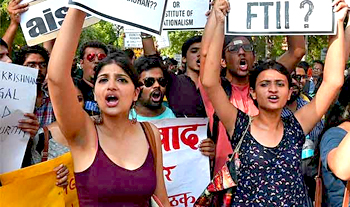New Delhi, Oct 29: Unable to force the government to scrap the appointment of Gajendra Chauhan as FTII chairman, agitating students on Wednesday unilaterally withdrew their 139-day-old strike but vowed to continue protests as ten eminent filmmakers returned their National Awards voicing solidarity with them and against growing intolerance in the country.
 "We are calling off the strike as a collective decision in the best interests of the students and returning to academics with immediate effect. But our protest will continue. We will take the battle forward," FTII Students Association representative Vikas Urs said in Pune.
"We are calling off the strike as a collective decision in the best interests of the students and returning to academics with immediate effect. But our protest will continue. We will take the battle forward," FTII Students Association representative Vikas Urs said in Pune.
As the lingering impasse at the Film and Television Institute of India ended, 10 frontline filmmakers including Dibakar Banerjee and Anand Patwardhan announced in Mumbai their decision to return the prestigious National Awards over government's "apathy" in addressing the students issues and the environment of intolerance.
"As filmmakers we stand with the students of FTII and are determined to not let them shoulder the entire burden of the protest," they said in a letter to President Pranab Mukherjee and Prime Minister Narendra Modi.
"We feel compelled to return the honour the state has bestowed on us. Condoling deaths without interrogating the forces that scripted those murder revealed a tacit acceptance of the ugly force distorting our country," they said.
"I am not here out of anger, outrage. Those emotions have long been exhausted. I am here to draw attention. Returning my very first National Award which I received for 'Khosla Ka Ghosla' is not easy. It was my first film and for many my most loved," Banerjee told a press conference.
"If there is intolerance of debate, of questioning and usually intolerance of a student body wanting to have a better teaching environment and that intolerance manifests in apathy, then that is what we are protesting against," he said.
Noted documentary maker Anand Patwardhan said the government has encouraged "extreme right wings".
"I haven't seen so many incidents happen at the same time. This is a sign of what is beginning to happen and I think that is why people are responding all over the country in different ways," he said, referring to the instances of writers returning their Akademi awards.
Banerjee said the decision of the students to resume classes is pragmatic as they are merely being responsible towards their colleagues and juniors.
The director said that he was "against the trivialisation" of the students protests by diverting attention from the core issues.
"... What other proof do you need of their sincerity and the validity of the attitude of the students of FTII than this. Not a single bus has been burnt, not a single stone has been thrown, they have only gone for debates and discussion."
Other filmmakers who have returned their awards are Nishtha Jain of "Gulabi Gang" fame, Paresh Kamdar, Kriti Nakhwa, "Hunterrr" director Harshvardhan Kulkarni, Hari Nair, Rakesh Sharma, Indraneel Lahiri and Lipika Singh Darai.





Comments
Add new comment